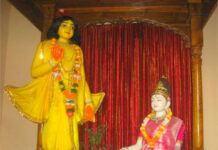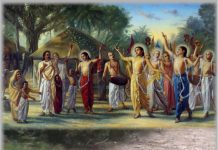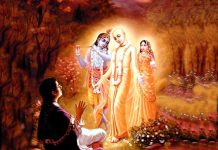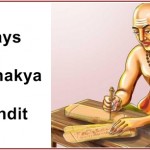Ever wished you had a genuine version of the Gita that you can read in a few minutes, and read it even daily? You might have come across texts that claim to summarize Gita for you in a few sentences or even one sentence! To put it straight- don’t go for them if you really want to know, learn, and practice what Lord Krishna taught His devotee, the great warrior Arjun, right in the middle of the battlefield of Kurukshetra, some 5000+ years ago.
Knowing the need of today’s people, His Divine Grace A.C. Bhaktivedanta Swami Prabhupada, the founder and acharya of ISKCON, wrote the following short text, “The Gita in a Nutshell” many years before his world famous Bhagavad Gita As It Is was published. It’s a marvel of his realization of this timeless teaching and shows how eager he was to help the conditioned souls. We request you to read and share it with whoever and wherever you can. Thank you!
———————————————————————–
The Gita In A Nutshell
by His Divine Grace A.C. Bhaktivedanta Swami Prabhupada
TO EDUCATE THOSE PERSONS who are enamored by empirical arguments and who do not receive transcendental knowledge through any bona fide disciplic succession and who are thus going astray we have compiled the essential knowledge of the Bhagavad-gita in a nutshell:
1) Lord Sri Krsna is the Supreme Absolute Truth, the Supreme Personality of Godhead, the cause of all causes. The definition of God is given in this aphorism from the Vedas: “By Him and from Him is manifest this universe, and He controls its creation, sustenance, and annihilation.” He is the mainstay of both this unlimited variegated cosmic manifestation and the immeasurable spiritual sky, the Vaikunthas. He is the eternally existing, transcendental Supreme Being with a spiritual form. The impersonal Brahman is but His bodily effulgence; He is the nondual Truth. The Supersoul (Paramatma) is His plenary expansion who resides in everyone’s heart and pervades the entire creation as well.
2) The jivas, the living entities, are Lord Krsna’s minute parts. Although the jiva is qualitatively nondifferent from the Lord, he is quantitatively different from Him, since the Lord is infinite and the jiva infinitesimal. The jiva is situated in the Lord’s marginal potency, which, inconceivably, is simultaneously one with and different from the Lord.
3) The jivas the marginal energy of the Lord have the ability to reside eternally either in Vaikuntha or in this material world. A jiva falls down to material nescience because of countless sinful activities, and in these alien surroundings he goes up and down, traveling through all the planetary systems, from Lord Brahma’s planet down to Patalaloka. In the material world the jiva experiences birth, disease, old age, and death and is forced to accept three types of suffering, namely, those miseries stemming from his own mind and body, those inflicted by other living entities, and those hurled at him by the demigods.
4) The conditioned living entities are encaged in this many-faceted prison-house called the material world. The nature of this world is creation, sustenance, and destruction. During creation and sustenance this material nature is in a manifest state, and with destruction it again becomes unmanifest. Thus this mundane, illusory realm is the Lord’s inferior energy because it is sometimes manifest and at other times unmanifest.
5) Beyond this manifest and unmanifest external energy of the Lord exists another realm, which is transcendental and spiritually variegated. This is the unlimited spiritual sky, known as Vaikuntha, which is everlasting. This realm is always manifest; it is never unmanifest. Thus it is not subject to creation and annihilation.
6) Those conditioned souls who identify with this illusory material nature and are proud of it, and who do not care to know about the Supreme Lord, are subjugated by the Lord’s illusory potency, who is known variously as Maha Kali, Candi, and Durga, and who pierces them with her trident of the threefold miseries. These demoniac jivas are forced into slavery by the illusory potency Kali, or Mahamaya. The Bhagavad-gita, the essence of all the Vedic scriptures, was compiled for the deliverance of the conditioned souls. By studying the Gita carefully, a jiva takes shelter of the Supreme Lord’s lotus feet and attains liberation from the merry-go-round of repeated suffering in the material world.
7) The conditioned jiva suffers from the material disease the miseries of birth, death, old age, and disease. When this suffering becomes unbearable, he looks for help. Those who are less intelligent embrace the path of impersonal liberation and undertake severe austerities to achieve their goal. More elevated than these salvationists are the devotees of the Lord, who realize that their eternal nature is to be His servants. They do not try to extinguish this nature but rather practice and preach the eternal process of devotion so they can enter the Lord’s eternal spiritual abode. All living entities have a right to practice this eternal process of devotional service.
08) The mahat-tattva, the material nature, manifests itself in twenty-four ingredients: 1) the unmanifest principle, 2) false ego, 3) intelligence, 4) mind, 5) ether, 6) air, 7) fire, 08) water, 9) earth, 10) sound, 11) touch, 12) form, 13) taste, 14) smell; 15) ears, 16) skin, 17) eyes, 18) tongue, 19) nose, 20) mouth, 21) hands, 22) feet, 23) anus, 24) genitals.
9) The undifferentiated Absolute Truth, the original Supreme Personality, Lord Sri Krsna, incarnates in this material world once in every day of Lord Brahma that is, once every 8,640,000,000 solar years to shower His mercy upon both His surrendered devotees and the atheistic nondevotees. He protects His devotees and slays the atheistic demons, thus giving the latter troublesome release, so to speak, in impersonal liberation. The Bhagavad-gita, on the other hand, teaches liberation through devotional service to the Supreme Lord. The only way to obtain this devotional service is to take full shelter of the spiritual authority, the guru, who is coming in the line of a proper disciplic succession. Those who toil without worshiping the spiritual master will find that all their endeavors are futile.
10) Those foolish souls who refuse to take shelter of a bona fide guru are truly shelterless. Without the guidance of a guru, these rascals consider themselves knowledgeable, and on the basis of this misconception they make the mistake of worshiping God as a man and a mere mortal as God.
11) The Supreme Personality of Godhead is full in six opulences and is not the property of any particular sect, group, or country. He is available to everyone. He is the deliverer of all and the supreme father of all. He appears in this material world to liberate every living entity, and His message, the Bhagavad-gita, is therefore applicable to every land and to all people. It is meant to be preached everywhere. Therefore those fortunate souls who are spreading the message of the Lord are most dear to Him.
12) Foolish, demoniac rascals in the grip of the Lord’s illusory energy loudly brag about their materialistic plans. The Bhagavad-gita alone can penetrate their hard shell of ignorance and awaken them to the truth.
13) With concerted, strong preaching, the devotees of Krsna must inform such foolish men that their so-called plans will surely be undermined because the platform they have chosen to build their dream houses on is factually a mirage a movie only. Reality is elsewhere. The information needed to transport one to that realm of reality and truth is available in the magazine called Back to Godhead.
14) Therefore, the real symptom of a good civilization is that its citizens are inspired by Back to Godhead to take up the process of devotion and go back to Godhead, where they will eternally reside in their actual home. Only in this way can they end all futile labor.
15) Just as the most sinful wretch lives in a ghostly body after death and moves about in the ether, having been denied a gross body, so the impersonalist, although rising to the point of liberation in the transcendental position, falls back down to the material world because of not having developed the mood of loving service to the Supreme Lord. Therefore the severe austerities and penances the impersonalist performs are not equivalent to the eternal religion of devotional service.
16) When monists are so attached to the formless, impersonal aspect of the Lord that they distinguish between Him and His transcendental body, their consciousness becomes contaminated by this blasphemy, and thus they are deprived of a place in the Lord’s eternal abode. But if by some good fortune they come in touch with a pure devotee and hear from him with faith about the Lord’s transcendental name, qualities, pastimes, and so on, then they will certainly be cleansed of their contamination and become inspired and attracted by the Lord’s glorious character, and finally they will surrender to Him fully. Thus the Bhagavad-gita is such an instructive text that for those who want to enter into the eternal pastimes of the Supreme Lord, its unequivocal message teaches the first stages of surrender, and this surrender is absolutely essential for reaching the ultimate destination. It is to be understood that the pure devotees have successfully passed this test of surrender according to the tenets of the Bhagavad-gita.
Renunciation Through Wisdom is a translation of Vairagya Vidya, a collection of essays written in Bengali by Srila Prabhupada in the late 1940s. The 250-page softbound book is available for $7.95 plus shipping from The Bhaktivedanta Book Trust, 3764 Watseka Ave., Los Angeles, CA 90034.




































